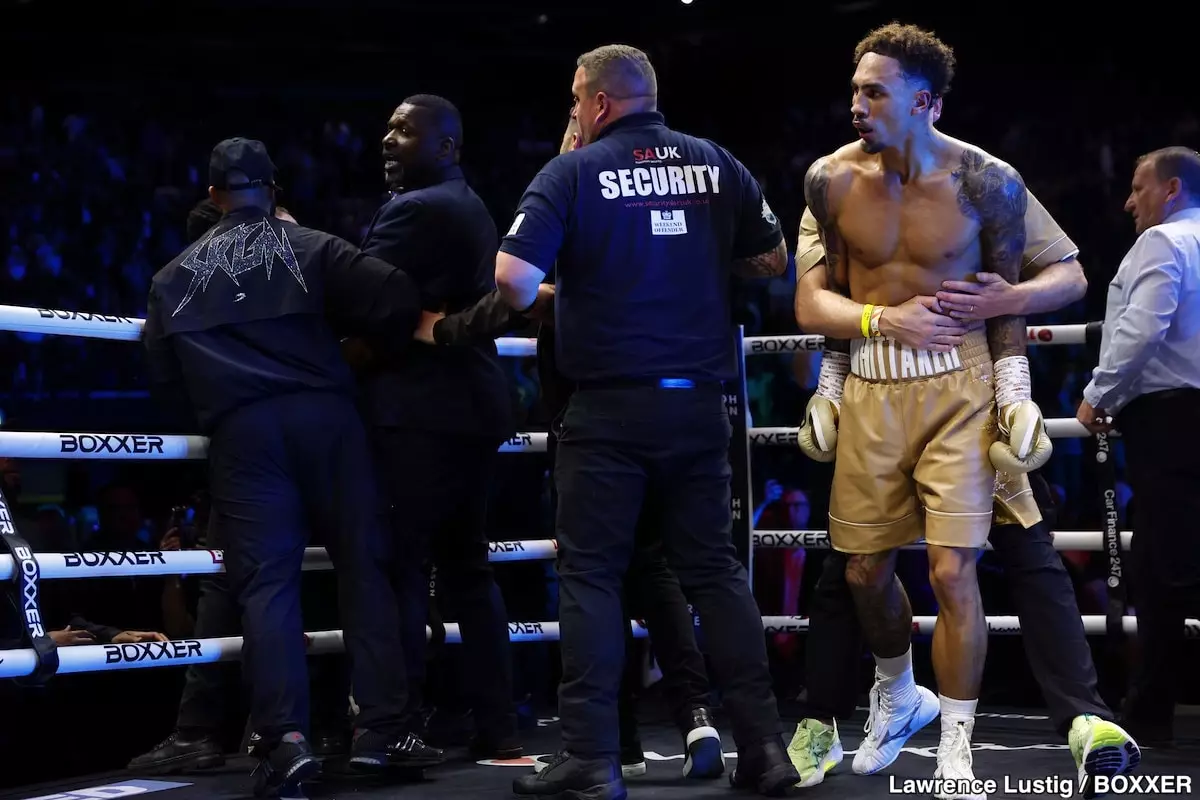In the unforgiving world of professional boxing, the distinction between victory and defeat often hinges on split-second decisions. For Liam Cameron (23-7-1, 10 KOs), the recent encounter with Ben Whittaker (9-0-1, 6 KOs) provided a stark reminder of this cruel reality. The second-round stoppage, officiated by Howard Foster during their high-stakes rematch at the Resorts World Arena in Birmingham, left many fans discontented and lamenting what they deemed a hasty judgment. Yet, in the face of adversity, Cameron chose not to dwell on bitterness but rather to embrace the moment with a surprising sense of optimism.
Despite the disheartening loss, Cameron expressed a remarkable level of resilience. He stated, “It is what it is,” showcasing an outlook that goes beyond the typical post-fight rhetoric. What stands out here is not just the acceptance of defeat, but how he redirected his focus toward a brighter future—specifically, the prospect of purchasing a new home with the financial rewards from the fight. This perspective provides intriguing insight into Cameron’s character; rather than mourning a premature end to his aspirations in the ring, he is planning for life beyond boxing, hinting at a maturity that is often overlooked in the sports arena.
The Controversial Call: A Different Angle on the Fight
The stoppage raised eyebrows, particularly among the knowledgeable boxing community. Viewers were quick to analyze the events that unfolded, noting that Cameron, a seasoned fighter, demonstrated considerable poise under pressure. During the moments leading up to the referee’s intervention, replays suggested that Cameron had skillfully absorbed most of Whittaker’s punches on his arms and gloves, making the decision to halt the contest appear overly reactionary. Fans were left questioning whether Foster would have called off the fight had roles been reversed. Such discussions reveal a larger narrative about fairness and the integrity of officiating in boxing—one that could have far-reaching implications on fighters’ careers and reputations.
Cameron’s acceptance of the controversial call further speaks volumes about his mental fortitude. Instead of employing excuses or engaging in blame, he acknowledged Whittaker’s performance while simultaneously reflecting on how the fight unfolded. His comments laced with humility displayed a deep understanding of the nature of competition. “A bit rushed,” he remarked, suggesting a respect for Whittaker’s strategy while also recognizing that his own potential could have allowed for a more extended contest.
Fans’ Outcry and the Role of Public Sentiment
Public sentiment has always played a crucial role in how athletes and events are perceived. In Cameron’s case, the audience reacted passionately against Foster’s decision, voicing their discontent across various platforms in hopes of rectifying a perceived injustice. This outpouring of support reflects not only the fans’ loyalty to Cameron but also a shared understanding of the sport’s unpredictability. They could envision a scenario where had Cameron been given the chance to fight back, the outcome could have been vastly different. The fact that the stoppage occurred under controversial circumstances only heightened the narrative, amplifying discussions around athletes’ rights to have their performance evaluated fairly.
In this context, Cameron stands as a figure who represents not just the athlete but the everyday person who faces setbacks and chooses to rise again. His respectful acknowledgment of Whittaker’s prowess, “What a comeback,” reinforces the understanding that in sports, as in life, setbacks often define our journeys as much as victories do.
The Road Ahead: A Focus on Growth
Looking forward, Cameron’s focus is not solely on the past but rather on personal development and seeking new opportunities. While many fighters might wallow in defeat, his perspective is refreshing. “I get my house bought now,” he cheerfully remarked, indicating that he is leveraging his experiences and income to build a future outside the ring. This attitude illustrates an important lesson—that resilience is not just about physical strength, but also about learning and adapting.
As Cameron continues his journey, he remains a poignant reminder that the path to success is rarely linear. Each challenge, such as the recent stoppage, serves as a brick on the road, contributing to the fighter he is becoming. His experiences and outlook may ultimately inspire not only his fans but also a new generation of athletes who learn to value their journeys, both triumphs and tribulations alike.


Leave a Reply